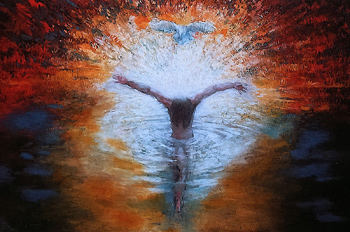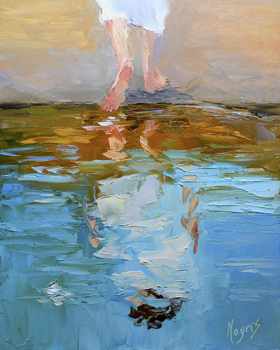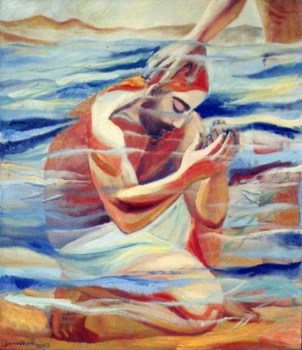For Sunday January 12, 2020
Lectionary Readings (Revised Common Lectionary, Year A)
Isaiah 42:1-9
Psalm 29
Acts 10:34-43
Matthew 3:13-17
On this first Sunday after the Epiphany, we find ourselves at the edge of the River Jordan with Jesus and his cousin, John. Jesus wants to be baptized, but John is reluctant to heed the Messiah’s request: “I need to be baptized by you, and do you come to me?” But Jesus insists, receives John’s baptism of repentance, and experiences a moment of divine revelation as he comes up out of the water.
The word “epiphany” comes from the Greek, "epiphaneia," meaning "appearing" or "revealing." During this brief liturgical season between Christmas and Lent, we’re invited to leave miraculous births and angel choirs behind, and seek the love, majesty, and power of God in seemingly mundane things. Rivers. Voices. Doves. Clouds. Holy hands covering ours, lowering us into the water of repentance and new life. In the Gospel stories we read during this season, God parts the curtain for brief, shimmering moments, allowing us to look beneath and beyond the ordinary surfaces of our lives, and catch glimpses of the extraordinary. Which is perhaps another way of describing the sacrament of baptism, one of the thin places where the "extraordinary" of God's grace blesses the ordinary water we stand in.
I was twelve years old when my father baptized me. I remember the day clearly — the June sun reflecting on the water; church members, friends, and extended family gathered around the pool, singing "Nothing But the Blood of Jesus," my father's hands covering mine as he lowered me into the water. "Upon your profession of faith in the Lord Jesus Christ, and in obedience to His divine command, I baptize you in the name of the Father, and of the Son, and of the Holy Spirit."
 |
Apparently — I don't remember this, but it's family lore — I started asking for baptism when I was barely three years old. "Asking" isn’t the right word, actually; if the rumors are true, I begged, cried, and even threw a few tantrums in my father's study, insisting that I was ready to get dunked.
My father disagreed; he wanted to make sure I understood what I was doing before I participated in a sacred ritual of the Church. (Of course, the irony of his caution is not lost on me now: if there was ever a time when I "understood what I was doing" as a Christian, it was probably at age three. Full of trust, open to love, and wholly captivated by Mystery. I'm sure my adult life has been one long attempt to return to such simple, beautiful comprehension.)
But my father had a point. In the evangelical tradition that raised me, baptism was understood to be a symbolic stepping out from the crowd. A personal demonstration of faith. "I choose to follow Christ. I choose to identify as a Christian. I choose to make a public declaration — without apology, without shame — of my private beliefs."
Accordingly, the question I had to answer before my father plunged me into the water was a creedal question. A "Do you personally accept and believe?" question. It was essential that I understood what I was choosing. After all, my baptism was a symbolic enactment of my faith.
I won’t argue with this understanding of the sacrament; I still find it meaningful in many ways. But when I read the story of Jesus’s baptism in this week’s Gospel, I don’t so much see a stepping out. I see a very intentional stepping in. A stepping into a history, a lineage, a geography, an identity. In receiving baptism, Jesus doesn’t set himself apart from us; he aligns himself with us. Baptism in Matthew's Gospel story is not about Othering. It's about solidarity. About joining.
On the day I was baptized, I had no felt sense that I was giving myself over to something larger, older, wiser, and more capacious than my own one-on-one with Christianity. Baptism, I thought, was all about my effort, my obedience, my responsibility. So much depended on me! There were so many ways I could mess up! I had no idea that my "personal decision to love God,” important though it is, pales in significance to God's cosmic decision to love me — and the whole of humanity and creation along with me. I didn't know that God was ushering me into a Story — a huge, sprawling Story that began eons before I showed up in my father's study with tiny fistfuls of belief.
 |
In other words, I didn’t know the paradoxical power of stepping in. Of giving myself over to something deeper and more trustworthy than the shifting sands of my own opinions, creeds, and doctrines: an ancient cloud of witnesses. A worldwide community of the faithful. A liturgy that endures. A created universe that whispers, laughs, and shouts God's name from every nook and corner.
According to Christian historian John Dominic Crossan, Jesus’s baptism story was an "acute embarrassment" for the early Church, precisely because of this stepping in. Why would God’s Messiah place himself under the tutelage of a rabble-rouser like John the Baptist? Why would God's incarnate Son receive a baptism of repentance? Repentance for what? Wasn’t he perfect? Why on earth would he wade into the murky waters of the Jordan, aligning himself with the great unwashed who teemed into the wilderness, reeking of sin? Worse, why did God the Father choose that sordid moment to part the clouds and call his Son beloved? A moment well before all the miracles, the healings, the exorcisms, the resurrections? A moment long before Jesus accomplished a thing worth praising?
Why, indeed? And yet this is the baffling, humbling, awe-inspiring story we’ve inherited as Christ's followers. Unbelievable though it may seem, Jesus’s first public act was an act of stepping into his humanity in the fullest, most embodied way. “Let it be so,” he told John, echoing the radical consent of his mother, Mary, who raised him in the faith. Let it be so at the hands of another, he decided, as he submitted to John the Baptizer, because what Jesus did and still does with power is freely surrender it, share it, give it away. Let it be so here, he said, in the Jordan River rich with sacred history. The Jordan where once upon a time his forbears, the ancient Israelites, entered the land of Canaan. The Jordan where the prophet Elijah ended his prophetic ministry, and his successor Elisha inaugurated his. The Jordan which flowed under the same “opened” sky God first opened "in the beginning," at the very dawn of Creation.
In other words, in this one moment, in this one act, Jesus stepped into the whole Story of God's work on earth, and allowed that story to resonate, deepen, and find completion.
So. What part of this story is hardest for you to take in? That God appears by means so unimpressive, so familiar, we often miss him? That Jesus enters joyfully into the full messiness of the human family? That our baptisms bind us to all of humanity — not in theory, but in the flesh — such that you and I are kin, responsible for each other in ways we fail too often to honor? That as Christians we are called into radical solidarity, not radical separateness? That we are always and already God's Beloved — not because we've done anything to earn it, but because God’s very nature, inclination, and desire is to love?
 |
To embrace Christ’s baptism story is to embrace the core truth that we are united, interdependent, connected, one. It is to sit with the staggering reality that we are deeply, deeply loved. Can we bear to embrace these mind-bending truths without flinching away in self-consciousness, cynicism, suspicion, or shame?
I'm still coming to terms with the truths of my baptism; I suspect I'll keep doing so for as long as I live. But I don't angst about belief as I used to; I believe and disbelieve a hundred times a day, and yet the efficacy of my baptism holds. That is the point — I am held. Not by my own profession of faith, but by the saving power of the One who holds history, holds time, holds earth and sun and wind and sky, and holds me. The One who parts the clouds, blesses the water, and calls me his beloved child.
Baptism — I understand now — is all about stepping in, all about surrender, all about finding the holy in the course of my ordinary, mundane life within the family of God. Which means I must choose Epiphany. Choose it, and then practice it. The challenge is always before me and before all of us: look again. Look harder. See freshly. Stand in the place that looks utterly ordinary, and regardless of how scared or jaded you feel, cling to the possibility of a surprise that is God. Listen to the ordinary, and know that it is infused with divine mystery. Epiphany is deep water — you can't dip your toes in. You must take a deep breath and plunge. Yes, baptism promises new life, but it always drowns before it resurrects.
What reason for hope, then? What shall we hang onto in this uncertain season of light and shadow? I believe we can hang onto Jesus. He's the one who opens the barrier, and shows us the God we long for. He's the one who stands in line with us at the water's edge, willing to immerse himself in shame, scandal, repentance, and pain — all so that we might hear the only Voice that will tell us who we are and whose we are in this sacred season. Listen. We are God's chosen. God's children. God's own. Even in the deepest, darkest water, we are the Beloved.
Debie Thomas: debie.thomas1@gmail.com
Image credits: (1) Peg Pondering Again; (2) Pixels.com; and (3) Artmajeur.com.



